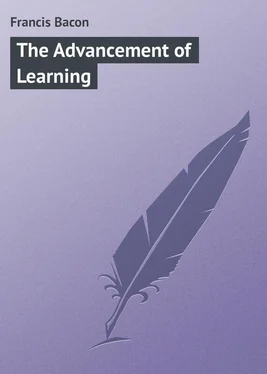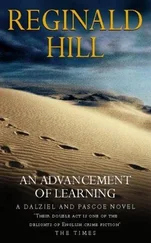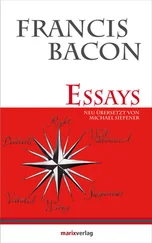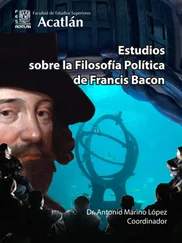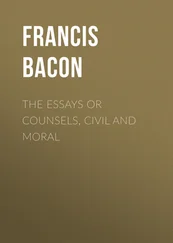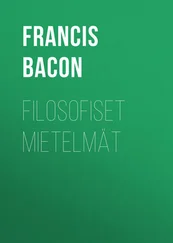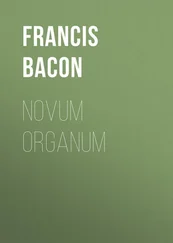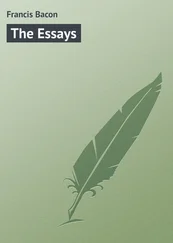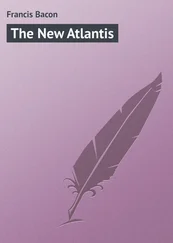Francis Bacon - The Advancement of Learning
Здесь есть возможность читать онлайн «Francis Bacon - The Advancement of Learning» — ознакомительный отрывок электронной книги совершенно бесплатно, а после прочтения отрывка купить полную версию. В некоторых случаях можно слушать аудио, скачать через торрент в формате fb2 и присутствует краткое содержание. Год выпуска: 0101, Жанр: foreign_antique, foreign_prose, на английском языке. Описание произведения, (предисловие) а так же отзывы посетителей доступны на портале библиотеки ЛибКат.
- Название:The Advancement of Learning
- Автор:
- Жанр:
- Год:0101
- ISBN:нет данных
- Рейтинг книги:5 / 5. Голосов: 1
-
Избранное:Добавить в избранное
- Отзывы:
-
Ваша оценка:
- 100
- 1
- 2
- 3
- 4
- 5
The Advancement of Learning: краткое содержание, описание и аннотация
Предлагаем к чтению аннотацию, описание, краткое содержание или предисловие (зависит от того, что написал сам автор книги «The Advancement of Learning»). Если вы не нашли необходимую информацию о книге — напишите в комментариях, мы постараемся отыскать её.
The Advancement of Learning — читать онлайн ознакомительный отрывок
Ниже представлен текст книги, разбитый по страницам. Система сохранения места последней прочитанной страницы, позволяет с удобством читать онлайн бесплатно книгу «The Advancement of Learning», без необходимости каждый раз заново искать на чём Вы остановились. Поставьте закладку, и сможете в любой момент перейти на страницу, на которой закончили чтение.
Интервал:
Закладка:
Francis Bacon
The Advancement of Learning
THE FIRST BOOK.
To the King.
There were under the law, excellent King, both daily sacrifices and freewill offerings; the one proceeding upon ordinary observance, the other upon a devout cheerfulness: in like manner there belongeth to kings from their servants both tribute of duty and presents of affection. In the former of these I hope I shall not live to be wanting, according to my most humble duty and the good pleasure of your Majesty’s employments: for the latter, I thought it more respective to make choice of some oblation which might rather refer to the propriety and excellency of your individual person, than to the business of your crown and state.
Wherefore, representing your Majesty many times unto my mind, and beholding you not with the inquisitive eye of presumption, to discover that which the Scripture telleth me is inscrutable, but with the observant eye of duty and admiration, leaving aside the other parts of your virtue and fortune, I have been touched – yea, and possessed – with an extreme wonder at those your virtues and faculties, which the philosophers call intellectual; the largeness of your capacity, the faithfulness of your memory, the swiftness of your apprehension, the penetration of your judgment, and the facility and order of your elocution: and I have often thought that of all the persons living that I have known, your Majesty were the best instance to make a man of Plato’s opinion, that all knowledge is but remembrance, and that the mind of man by Nature knoweth all things, and hath but her own native and original notions (which by the strangeness and darkness of this tabernacle of the body are sequestered) again revived and restored: such a light of Nature I have observed in your Majesty, and such a readiness to take flame and blaze from the least occasion presented, or the least spark of another’s knowledge delivered. And as the Scripture saith of the wisest king, “That his heart was as the sands of the sea;” which, though it be one of the largest bodies, yet it consisteth of the smallest and finest portions; so hath God given your Majesty a composition of understanding admirable, being able to compass and comprehend the greatest matters, and nevertheless to touch and apprehend the least; whereas it should seem an impossibility in Nature for the same instrument to make itself fit for great and small works. And for your gift of speech, I call to mind what Cornelius Tacitus saith of Augustus Cæsar: Augusto profluens , et quæ principem deceret , eloquentia fuit . For if we note it well, speech that is uttered with labour and difficulty, or speech that savoureth of the affectation of art and precepts, or speech that is framed after the imitation of some pattern of eloquence, though never so excellent; all this hath somewhat servile, and holding of the subject. But your Majesty’s manner of speech is, indeed, prince-like, flowing as from a fountain, and yet streaming and branching itself into Nature’s order, full of facility and felicity, imitating none, and inimitable by any. And as in your civil estate there appeareth to be an emulation and contention of your Majesty’s virtue with your fortune; a virtuous disposition with a fortunate regiment; a virtuous expectation (when time was) of your greater fortune, with a prosperous possession thereof in the due time; a virtuous observation of the laws of marriage, with most blessed and happy fruit of marriage; a virtuous and most Christian desire of peace, with a fortunate inclination in your neighbour princes thereunto: so likewise in these intellectual matters there seemeth to be no less contention between the excellency of your Majesty’s gifts of Nature and the universality and perfection of your learning. For I am well assured that this which I shall say is no amplification at all, but a positive and measured truth; which is, that there hath not been since Christ’s time any king or temporal monarch which hath been so learned in all literature and erudition, divine and human. For let a man seriously and diligently revolve and peruse the succession of the Emperors of Rome, of which Cæsar the Dictator (who lived some years before Christ) and Marcus Antoninus were the best learned, and so descend to the Emperors of Græcia, or of the West, and then to the lines of France, Spain, England, Scotland, and the rest, and he shall find this judgment is truly made. For it seemeth much in a king if, by the compendious extractions of other men’s wits and labours, he can take hold of any superficial ornaments and shows of learning, or if he countenance and prefer learning and learned men; but to drink, indeed, of the true fountains of learning – nay, to have such a fountain of learning in himself, in a king, and in a king born – is almost a miracle. And the more, because there is met in your Majesty a rare conjunction, as well of divine and sacred literature as of profane and human; so as your Majesty standeth invested of that triplicity, which in great veneration was ascribed to the ancient Hermes: the power and fortune of a king, the knowledge and illumination of a priest, and the learning and universality of a philosopher. This propriety inherent and individual attribute in your Majesty deserveth to be expressed not only in the fame and admiration of the present time, nor in the history or tradition of the ages succeeding, but also in some solid work, fixed memorial, and immortal monument, bearing a character or signature both of the power of a king and the difference and perfection of such a king.
Therefore I did conclude with myself that I could not make unto your Majesty a better oblation than of some treatise tending to that end, whereof the sum will consist of these two parts: the former concerning the excellency of learning and knowledge, and the excellency of the merit and true glory in the augmentation and propagation thereof; the latter, what the particular acts and works are which have been embraced and undertaken for the advancement of learning; and again, what defects and undervalues I find in such particular acts: to the end that though I cannot positively or affirmatively advise your Majesty, or propound unto you framed particulars, yet I may excite your princely cogitations to visit the excellent treasure of your own mind, and thence to extract particulars for this purpose agreeable to your magnanimity and wisdom.
I. (1) In the entrance to the former of these – to clear the way and, as it were, to make silence, to have the true testimonies concerning the dignity of learning to be better heard, without the interruption of tacit objections – I think good to deliver it from the discredits and disgraces which it hath received, all from ignorance, but ignorance severally disguised; appearing sometimes in the zeal and jealousy of divines, sometimes in the severity and arrogancy of politics, and sometimes in the errors and imperfections of learned men themselves.
(2) I hear the former sort say that knowledge is of those things which are to be accepted of with great limitation and caution; that the aspiring to overmuch knowledge was the original temptation and sin whereupon ensued the fall of man; that knowledge hath in it somewhat of the serpent, and, therefore, where it entereth into a man it makes him swell; Scientia inflat ; that Solomon gives a censure, “That there is no end of making books, and that much reading is weariness of the flesh;” and again in another place, “That in spacious knowledge there is much contristation, and that he that increaseth knowledge increaseth anxiety;” that Saint Paul gives a caveat, “That we be not spoiled through vain philosophy;” that experience demonstrates how learned men have been arch-heretics, how learned times have been inclined to atheism, and how the contemplation of second causes doth derogate from our dependence upon God, who is the first cause.
Читать дальшеИнтервал:
Закладка:
Похожие книги на «The Advancement of Learning»
Представляем Вашему вниманию похожие книги на «The Advancement of Learning» списком для выбора. Мы отобрали схожую по названию и смыслу литературу в надежде предоставить читателям больше вариантов отыскать новые, интересные, ещё непрочитанные произведения.
Обсуждение, отзывы о книге «The Advancement of Learning» и просто собственные мнения читателей. Оставьте ваши комментарии, напишите, что Вы думаете о произведении, его смысле или главных героях. Укажите что конкретно понравилось, а что нет, и почему Вы так считаете.
